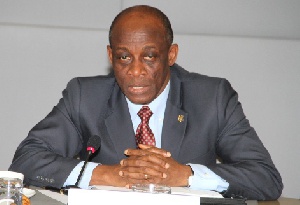 Minister of Finance, Seth Terpker
Minister of Finance, Seth Terpker
Government tightened its fiscal position in the first half of the year after exceeding its revenue target for the period by more than GH¢770million, despite falling short on donor support inflows.
The excess revenue, met on the back of a difficult business operating environment caused by unstable currency and erratic power supply, cushions the state’s purse against the excessive spending of government within the period.
According to provisional fiscal figures released by the Finance Ministry, government raked in a little more than GH¢14.97billion in revenue as against a target of GH¢14.2billion.
At the same time, its GH¢17.5 billion expenditure for the period exceeded the spending target of GH¢17.4billion, which according to the figures was caused mainly by overspending on goods and services, capital expenditure and what the Finance Ministry described as “other expenditure”.
Nonetheless, the GH¢3.27billion budget deficit expected for the first half of the year was cut to GH¢2.56billion on account of higher than expected revenue.
However, it missed its grants revenue target of GH¢1billion by GH¢138.7million, signaling that some donors are yet to release locked funds as they are still unconvinced with the government’s plans to fight corruption and better manage the economy, despite involvement of the International Monetary Fund (IMF) in government’s economic management programme.
But the contraction of budget deficit is a reprieve to monetary policymakers, since the Bank of Ghana has over the past four years been the main source of funding for government’s huge deficit -- with the IMF expecting the central bank to completely shy away from printing money to finance the government’s budget, latest by 2016; before which the central bank’s financial assistance to government must be limited to five percent of the previous year’s revenue.
The narrowed deficit also offers a sense of optimism to the private sector businesses, which have been crowded out in the race for capital investment for some time due to government’s voracious appetite for borrowing through issuance of Treasury bonds to finance the budget deficit.
As at the first half of the year, government had borrowed a little above GH¢26.18billion in the first half of this year, which is more than the GH¢25.42billion it had planned to borrow from the domestic securities market.
This happened at a time when credit to the private sector had declined. According to the central bank’s latest financial stability report released in June this year, growth in the gross loans and advances of the banking industry in year-on-year terms declined from 22.8 percent last year to 18.7 percent at the end of March 2015.
Similarly, credit to the private sector also grew by 16.8 percent at end of March 2015 compared with the 24.1 percent growth at the end of March 2014. Also, credit to households grew by 15.1 percent in March 2015 compared with 19 percent growth recorded in the same period in 2014.
Several economists have thus called on the government to tame the craze of borrowing to finance its spending in order to free funds for the private sector -- supposedly considered the engine of growth.
The IMF as part of the US$918million budgetary support granted to Ghana in April this year admonished government to adopt a prudent borrowing strategy in order to improve the country’s debt distress situation, which has seen the debt-to-GDP ratio jump from 54.8% in 2013 to 67.2% at the end of 2014.
On the expenditure side, the IMF has also advised government to restrain the wage bill, which has been one of the main reasons for the country’s fiscal imbalances, by limiting the nominal increase in the total wage bill to 10 percent; scrap the 10 percent Cost of Living Allowance granted to workers last year, and also get an agreement with labour unions on a 13 percent wage increase over the 2013 nominal basic wage.
Additionally, the Fund wants government to freeze employment into the public sector, except the education and health sectors, and also do away with subsidies for utilities and fuel consumption by ensuring that the automatic adjustment formula is implemented to the core.